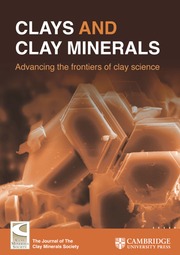Article contents
In Situ Characterization and Differentiation of Kaolinites in Lateritic Weathering Profiles Using Infrared Microspectroscopy
Published online by Cambridge University Press: 01 January 2024
Abstract
Lateritic weathering kaolinites have been characterized in situ and differentiated for the first time by means of infrared microspectroscopy (IRMS). Four classical OH-stretching bands have been observed in the Fourier transform infrared (FTIR) spectra, at 3695, 3668, 3650 and 3620 cm−1, denoted ν1, ν2, ν3 and ν4, respectively, plus a band at 3595 cm−1 associated with the octahedral substitution of Fe3+ for Al3+. Infrared microspectroscopy of thin-sections of lateritic weathering profiles provides useful information on the types of kaolinite present in different horizons of the profile. The spectra obtained from large well-ordered kaolinite crystals look like those obtained by diffuse reflectance in that, compared with the KBr disk spectra of <2 µm powders, bands at 3668 and 3650 cm−1 are enhanced, and the strong absorption of KBr disks at 3695 cm−1 is replaced by a broad weaker band from 3700–3680 cm−1. In laterites, these large well-ordered kaolinites often exhibit a band at 3595 cm−1 indicative of significant Fe3+ substitution for Al3+ in the structure. The IR microspectra obtained from regions of small, more poorly-ordered kaolinites do not differ so markedly from that of KBr disks. All show enhanced absorption around 3650 cm−1 compared with well-ordered kaolinites, indicating that the disorder is due, at least in part, to domains of dickite-like and/or nacrite-like stacking in their structure. The 3595 cm−1 band is always weaker than that of the well-ordered kaolinite in the same profile. The IRMS data from well-characterized reference kaolinites show that the ratio Aν2/Aν3 is a pertinent IR order index for kaolinites. The larger this index, the larger is the area of the 3595 cm−1 band, and the larger and the more ordered is the kaolinite sample. It is suggested that the diversity of FTIR spectra observed reflects intergrowths of kaolinite-dickite polymorphs, or at least mixtures of high- and low-defect kaolinites which are frequently encountered in the lateritic geosphere rather than pure kaolinitic phases. The largest kaolinites having secondary crystallized in voids are the most ordered and the most ferruginous and have been considered as useful mineralogical tracers of the recent evolution of old lateritic terrains.
Keywords
- Type
- Research Article
- Information
- Copyright
- Copyright © 2002, The Clay Minerals Society
References
- 22
- Cited by


